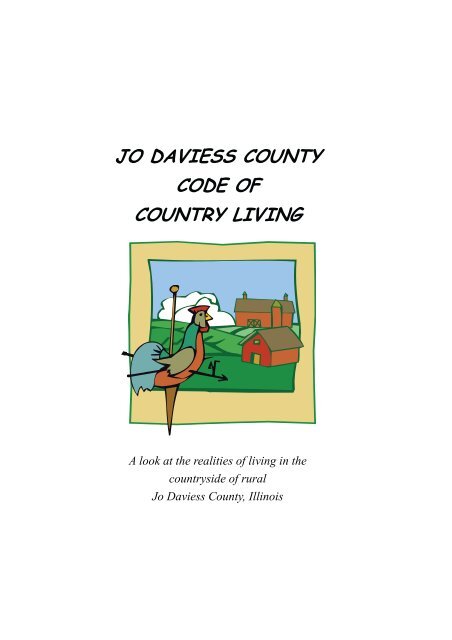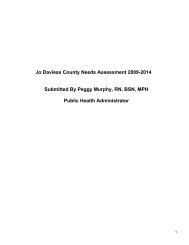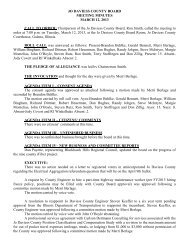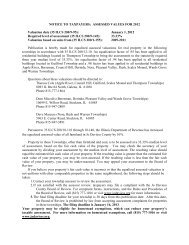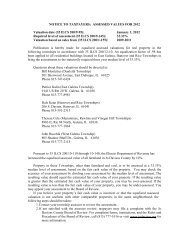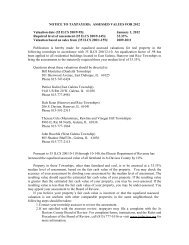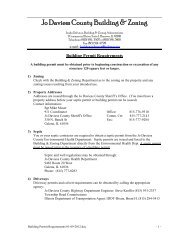jo daviess county code of country living - Jo Daviess County, Illinois
jo daviess county code of country living - Jo Daviess County, Illinois
jo daviess county code of country living - Jo Daviess County, Illinois
- No tags were found...
You also want an ePaper? Increase the reach of your titles
YUMPU automatically turns print PDFs into web optimized ePapers that Google loves.
1 ACCESSYour ability to get to and from your property will vary. Changingconditions and lower design level roads mean that you, your guests andemergency service vehicles will not necessarily have easy access at alltimes. Please consider the following:1.1 - Don’t expect rural roads to be maintained at the same level as cityand state streets. Counties and townships have primary responsibility forroad maintenance in rural areas. Some roads may be privately owned —requiring private maintenance funding. Seldom do rural roads include theamenities found in urban settings such as: wide lanes, curb and gutter,paved shoulders, and striping. And, the cost <strong>of</strong> maintaining those roadswill come primarily from property taxes you and your neighbors pay.1.2 - <strong>Jo</strong> <strong>Daviess</strong> <strong>County</strong>’s fluctuating weather conditions can affect roads.Spring freeze/thaw cycles leave low-grade roads subject to heavy damageand can even temporarily close some roads. Vehicle weights are <strong>of</strong>tenlimited during the spring thaw period and roads can be posted formaximum weight allowances. In the summer, the hot sun can bake ands<strong>of</strong>ten oil and chip road surfaces, leaving them damaged by traffic andcausing oil splatters on vehicles.1.3 - Small, narrow roads and bridge weight limits <strong>of</strong>ten restrict travel.Large construction vehicles cannot navigate in some areas. If you plan tobuild, it’s best to check out construction access well in advance.1.4 - Building a residence in a rural area may be more expensive and timeconsuming due to delivery fees and time required for contractors andconstruction workers to reach your building site.4
1.5 - School buses generally can reach most rural homes, though longprivate lanes or rural subdivision settings may force school children towalk to the site <strong>of</strong> pickup.1.6 - <strong>Jo</strong> <strong>Daviess</strong> <strong>County</strong> topography is subject to drifting snow that closesroads, causes delays and creates travel hazards. Depending on the degree<strong>of</strong> drifting, it could be days before roads are cleared. Freezing rain too,creates extremely dangerous travel conditions. Few rural road jurisdictionscan afford salt to fight icy conditions.1.7 - In some areas, roadways may become flooded. Heavy rains on steepland can easily cover roads with water and debris, blocking or evendestroying them. <strong>Illinois</strong>’ abundance <strong>of</strong> rivers, creeks, streams andwaterways makes its rural areas prone to roadway flooding.1.8 - Gravel roads generate dust and dings. Some road jurisdictions treatgravel roads to suppress the dust when traffic levels reach specificvolumes, but dust is still a fact <strong>of</strong> life for many rural residents. Loosegravel on these roads regularly chips vehicle paint and at times may cracka windshield. If your homesite is located along a gravel road, know thatdust will invade your home and vehicles, and may disrupt outsideactivities.1.9 - Whatever the design <strong>of</strong> your road, don’t expect that it will beimproved in the foreseeable future. Check carefully with the roadjurisdiction if any claim is made that a gravel road will be paved, bridgesreplaced, or other improvements made.1.10 - Just because a parcel has road frontage it is not always possible tohave an entrance. Safe sight distance is sometimes hard to find with therolling hills <strong>of</strong> <strong>Jo</strong> <strong>Daviess</strong> <strong>County</strong>.1.11 - Access to and from public roads is regulated by the roadjurisdiction. If you are planning to build, be sure to check in advanceabout authorization and placement <strong>of</strong> private drives and culverts.5
1.12 - 9-1-1 emergency call-in service is available but response times <strong>of</strong>emergency service providers will likely be longer than in the city. Undersome extreme conditions, you may find that emergency response is veryslow and expensive. At best, the distances they must travel to reach youare longer than those within the city and will require more time.1.13 - The legal aspects <strong>of</strong> access can cause problems, especially if yougain access across property belonging to others. Get legal advice andunderstand the easements that may be necessary when these questionsarise.1.14 - Mail delivery is generally available in all rural areas though timingmay suffer in some locations.1.15 - Direct, daily newspaper delivery is not always available in ruralareas. US Postal delivery <strong>of</strong> newspapers is an option but generally causesa one-day delay. Check with the newspaper <strong>of</strong> your choice beforeassuming you can get same-day delivery.1.16 - Standard parcel and overnight package delivery in the <strong>country</strong> mayvary from city standards. Check with the carrier to find what service levelcan be expected.1.17 - In rural areas, most railroad crossings are not lighted or gated.Please proceed cautiously when approaching a rural railroad crossing.1.18 - In rural areas many farm fields have access points from rural roads,and these access points are not always visible. Please be alert to farmmachinery pulling onto or <strong>of</strong>f <strong>of</strong> roadways. Roadway intersections in ruralareas are not always at-grade or highly visible, so travel alertly.1.19 - Public transportation in <strong>Jo</strong> Daivess <strong>County</strong> isvery limited, so traveling will most likely be done ina privately-owned vehicle. Be cognizant <strong>of</strong> the roadconditions and time <strong>of</strong> day, while obeying trafficlaws.6
2 UTILITIESWater, sewer, electric, telephone and other utilities may be unavailable oroperate at lower than urban standards. Repairs can <strong>of</strong>ten take longer thanin towns and cities. Review your options before buying a rural site.2.1 - Although <strong>Jo</strong> <strong>Daviess</strong> <strong>County</strong> has a choice in cellularservice providers, cell phones may not work in all areas.2.2 - Links to Internet provider services via phone linemay require a long-distance phone connection. Not all ruralcommunities have a local Internet access provider, though many schoolsystems do <strong>of</strong>fer some connection options.2.3 - Sewer service is rarely available. If it is, it may be relativelyexpensive to connect to the system and routine fees could be relativelyhigh compared to city rates.2.4 - If sewer is not available, you will need to use an approved septicsystem for wastewater treatment. The <strong>Jo</strong> <strong>Daviess</strong> <strong>County</strong> EnvironmentalHealth Department recommends that the following be done before youpurchase a piece <strong>of</strong> property.A. For vacant land, have a soil investigation completed. The type anddepth <strong>of</strong> soil you have available will be very important in determiningthe cost <strong>of</strong> your new septic system. A list <strong>of</strong> approved Soil Boringcontractors is available at the <strong>Jo</strong> <strong>Daviess</strong> <strong>County</strong> EnvironmentalHealth Department (815/777-0283).B. If purchasing an existing home, contact the <strong>Jo</strong> <strong>Daviess</strong> <strong>County</strong>Environmental Health Department (815/777-0283) and arrange for aMortgage Loan Inspection. They will evaluate the septic system forany <strong>code</strong> violations and determine if the system is sized properly.2.5 - Septic system requirements vary. <strong>Jo</strong> <strong>Daviess</strong><strong>County</strong> has significant regulations stipulating thetype and size <strong>of</strong> the sewage disposal (septic) systemor sewage treatment system you must have. Fordetails on <strong>Jo</strong> <strong>Daviess</strong> <strong>County</strong>’s sewage disposalrequirements contact the <strong>Jo</strong> <strong>Daviess</strong> <strong>County</strong>Environmental Health Department (815/777-0283).7
2.6 - Locating the septic system requires careful planning. Sufficient areawill be needed for installing the septic tank and drain field a suitabledistance from the residence and water supply. Floodplains, wetlands, trees,manmade structures, and other factors may limit where the septic systemcan be placed. Also, access will be needed to the septic tank for futurecleanout operations. Septic tanks should be pumped by a licensedcontractor every 3-4 years under normal use. Location <strong>of</strong> the septic systemin relation to wells is also a ma<strong>jo</strong>r consideration.2.7 - If you have access to a supply <strong>of</strong> potable waterfrom an outside provider, the tap fee can be expensive.You may also find that your monthly cost <strong>of</strong> servicecan be more expensive when compared to municipalsystems.2.8 - If you do not have access to a supply <strong>of</strong> potablewater, you will have to locate one. The most commonmethod is the use <strong>of</strong> a private water well, but in some areas public wellwater or community water may be available. Permits for wells may berequired in areas served by a water authority, and the cost for drilling andpumping can be considerable. The quality and quantity <strong>of</strong> well water canvary significantly from location to location and from season to season. It isstrongly advised that you research this issue carefully. Contact the <strong>County</strong>Environmental Health Department (815/777-0283) for more information.2.9 - Electric service is generally available to all rural areas. However, apower company asked to serve remote areas may demand a share <strong>of</strong> theinfrastructure cost be borne by the user. It is important to determine theproximity <strong>of</strong> an electrical power supply; extending lines is expensive.2.10 - In order to get electric power or other utilities to your homesite, itmay be necessary to cross property owned by others. It is important tomake sure that the proper easements are in place or can be secured to allowlines to be installed to your own property.8
2.11 - Electrical power lines, telephone linesand pipelines may cross over, under, or nearbyyour property. Be aware <strong>of</strong> easements to theproperty and those nearby, and what they allowthe utility providers to do in the way <strong>of</strong> access,maintenance and expansion.2.12 - At least 48 hours prior to doing anydigging, call JULIE (<strong>Jo</strong>int Utilities LocatingInformation for Excavators) in order to locateunderground utility lines. You can reach JULIE24 hours a day, seven days a week at 800-892-0123.2.13 - Electric power may not be available in a three phase serviceconfiguration. If you have special power requirements, it is important toknow what level <strong>of</strong> service can be provided and at what cost.2.14 - In addition to a monthly charge for energy consumed, the cost <strong>of</strong>electric service usually includes a fee to hook into the system. Someutilities charge further for the cost <strong>of</strong> establishing service lines and poleson your property. Check to see what supplier provides power to the areathen consider all costs before making a decision to purchase property inthe <strong>country</strong>.2.15 - Power outages can occur with more frequency and last longer inrural areas than in urban settings. A loss <strong>of</strong> electric power can interruptyour supply <strong>of</strong> water from a well. You may also lose food in freezers orrefrigerators depending on the duration <strong>of</strong> the outage. Such outages cancause problems with computers and other home electronics, as well as loss<strong>of</strong> your heating source. If you live in the <strong>country</strong>, it is important to beprepared to survive for several days in severe cold without electricalpower.2.16 - Cable television service may not be available or may be costly toobtain in rural areas. If you wish to have cable television service at yourhome, check with the local cable provider.9
2.17 - Natural gas may not be available. Most municipalities have naturalgas service for whole-house heating, cooking, water heating, dryingclothes and other uses. Rural areas seldom have that service. You could,instead, rely on electric power which is <strong>of</strong>ten more expensive (for heatproducingappliances). The alternative is having Liquid Propane Gas orheating oil delivered by truck and stored in a tank on your property.2.18 - If relying on gas deliveries, you must be certain that your supply isadequate to get you through winter’s coldest periods when access forreplenishing supplies may be limited by weather and road conditions orother factors.2.19 - Gas appliances may need to be converted if youchoose to use Liquid Propane Gas as your energy source.When converting a gas appliance to Liquid Propane Gas,such conversion should be made by a qualified servicetechnician. Not doing so may result in a dangerous lifethreateningsituation.2.20 - Routine trash removal may not be available in all rural areas. Whereit is, it most <strong>of</strong>ten requires a separate fee. Trash pickup is seldom providedas a government service in rural areas and is not covered by the taxes youpay. It is illegal to create your own trash dump, even on your own land.Consider the cost for hiring trash removal as you make the decision tomove into the <strong>country</strong>. In some cases, your only option may be to haulyour trash to the Transfer Station yourself.2.21 - Recycling may be difficult in rural areas. Recycling pickup may notbe available and rural areas have few recycling centers. <strong>Jo</strong> <strong>Daviess</strong> <strong>County</strong>does have a recycling station located on Highway 20 just west <strong>of</strong>Elizabeth.2.22 - Yard waste cannot be included in your trash pickup service. Youshould check with the University <strong>of</strong> <strong>Illinois</strong> Extension, <strong>Jo</strong> <strong>Daviess</strong>(815/858-2273) on possible solutions to disposal <strong>of</strong> yard waste includingcomposting.10
3 PROPERTYYour property can be impacted by a myriad <strong>of</strong> issues. Research at leastthese key ones before purchasing land.3.1 - Building a home may not be possible on all sites. The area may notbe suitable for building or may not be zoned residential. You must checkwith the <strong>County</strong> Building & Zoning Department (815/591-3810) to knowif a parcel <strong>of</strong> land may be developed.3.2 - <strong>Jo</strong> <strong>Daviess</strong> <strong>County</strong> is zoned, and a zoning (building) permit isrequired for all structures and improvements. If you buy property in <strong>Jo</strong><strong>Daviess</strong> <strong>County</strong>, it is always wise to check on the designated zoning.Your intended use <strong>of</strong> the property is not always possible. You may haveto request a zoning change through the Planning Commission. Whilezoning imposes limitations on land use, it also provides some safeguardsagainst undesirable uses <strong>of</strong> neighboring property. Check with the <strong>Jo</strong><strong>Daviess</strong> <strong>County</strong> Building & Zoning Department (815/591-3810) for moreinformation.3.3 - <strong>Jo</strong> <strong>Daviess</strong> <strong>County</strong> (each city and/or village has their own Building/Zoning requirements) has adopted the 2009 International Building Code,International Residential Code, Mechanical Code, Fuel Gas Code, andEnergy Conservation Code, as well as the National Electrical Code, andthe IL Plumbing Code and IL Accessibility Code, which means there arelocal standards for construction. When having a house or any buildingconstructed, it is the responsibility <strong>of</strong> the owner/contractor to insure that aBuilding permit is obtained from the <strong>Jo</strong> <strong>Daviess</strong> <strong>County</strong> Building &Zoning <strong>of</strong>fice (815/591-3810). Failing to do so may result in a fine.11
3.4 - Easements should be considered. These may require you to allowconstruction <strong>of</strong> roads, railroads, power lines, gas lines, water lines, sewerlines, etc., across your land. Utility lines may cross over, under, or nearbyyour property. Be aware <strong>of</strong> easements to the property and those parcelsnearby and what they allow the easement owner to do in the way <strong>of</strong> access,maintenance and expansion. There may be easements that are not <strong>of</strong>record. Check these issues carefully.3.5 - Many property owners do not own the mineral rights under theirproperty. Owners <strong>of</strong> mineral rights generally have the ability to change thesurface characteristics in order to extract their minerals. It is veryimportant to know what minerals may be located under the land and whoowns them. Much <strong>of</strong> the rural land in <strong>Illinois</strong> can be used for mining,however, a special review by the Planning Commission is usually required.Be aware that adjacent mining uses might expand and could impact yourproperty.3.6 - You may be provided with a plat <strong>of</strong> your property, but unless the landhas been surveyed and pins placed by a licensed surveyor, you should notassume that the plat is accurate.3.7 - What appear to be boundary fences are not necessarily accuratelyplaced. Some merely approximate boundaries. A survey <strong>of</strong> the land is theonly way to confirm the exact location <strong>of</strong> your property lines. The <strong>Illinois</strong>law <strong>of</strong> “Adverse Possession” could actually cause you to lose some land toan adjacent owner over a period <strong>of</strong> years if property boundaries are notproperly determined and defined.3.8 - What you think <strong>of</strong> as your neighbor’s fence may cost you money.<strong>Illinois</strong>’ fence law requires that ad<strong>jo</strong>ining land owners share in a “justproportion” <strong>of</strong> the cost <strong>of</strong> constructing and maintaining a property linefence. That applies despite the fact that you may have no use for nor desirefor the fence.12
3.9 - Watch for areas designated as “floodplains.” Local, state and federalregulations prohibit or limit the types <strong>of</strong> structures built in floodplains. Ifallowed at all, certain - <strong>of</strong>ten expensive - modifications to the design maybe required. Also, government flood insurance could be required by yourmortgage lender. Permits may also be required from government agenciesand they can be costly and time-consuming to acquire.3.10 - Many subdivisions have covenants that limit the use <strong>of</strong> the property.It is important to obtain a copy <strong>of</strong> the covenants (or confirm that there arenone) and make sure that you can live with those rules. Not having acovenant doesn’t eliminate all problems, it simply means that you willlack a powerful tool that could be used to settle disputes betweenneighbors.3.11 - Homeowners’ Associations (HOA’s) in some subdivisions arerequired to take care <strong>of</strong> common elements, private roads, open space, etc.A dysfunctional homeowners’ association or poor covenants can causeproblems for you and even involve you in expensive litigation.3.12 - Dues are almost always a requirement for those residing in areasserved by an HOA. The by-laws <strong>of</strong> the HOA should tell you how theorganization operates and how dues are established.3.13 - The view from your property may change. Nearby properties willnot necessarily remain as they are indefinitely. Check with the Building &Zoning Department (815/591-3810) to find out how the properties arezoned near you, and to see what future developments may be planned.3.14 - Maintenance <strong>of</strong> others’ drainage structures could impact you. Ifthere is a ditch on your property there is a good possibility that the owners<strong>of</strong> the ditch have the right to come onto your property to maintain it.Heavy equipment might be used leaving considerable damage. While<strong>Illinois</strong> law requires basic compensation, you may have to negotiatesettlement for damages.13
3.15 - Your drainage practices must conform to the <strong>Illinois</strong> Drainage Codeand <strong>Jo</strong> <strong>Daviess</strong> <strong>County</strong> regulations. Generally, land owners must acceptthe natural flow <strong>of</strong> water onto their property and discharge from theirproperty the water at its natural point and rate <strong>of</strong> flow. Contact the <strong>Jo</strong><strong>Daviess</strong> <strong>County</strong> Soil & Water Conservation District (815/858-3418) forinformation about drainage and water flow in your area. In some casesthey can provide cost-share funding to install conservation structures onyour property.3.16 - Parts <strong>of</strong> <strong>Illinois</strong> are criss-crossed with underground field drainagetile, and <strong>Jo</strong> <strong>Daviess</strong> <strong>County</strong> is no exception. If you have one running acrossyour property, there is a good possibility that the owners or users <strong>of</strong> the tilehave the right to come onto your property to maintain it. If you disturbsuch a tile - during construction or otherwise - you could be heldresponsible for damages that result to crops and property as a cause <strong>of</strong> youractions.3.17 - Your property may be situated within a water district. If so, you maybe subject to a restriction on digging or operating a well for water supplyin addition to additional property taxes.3.18 - <strong>Illinois</strong> has an Abandoned Well law requiring land owners toproperly seal abandoned wells located on their property. Contact the <strong>Jo</strong><strong>Daviess</strong> <strong>County</strong> Environmental Health Department (815/777-0283) fornames <strong>of</strong> contractors licensed to seal abandoned wells.3.19 - Your property is there for your reasonable use and en<strong>jo</strong>yment. Asyou would expect others to respect your private property, please <strong>of</strong>ferother land owners the same respect and courtesy. Do not knowingly orunknowingly trespass or cause damage to others’ property.14
4 NATUREWhen the elements and earth turn unfriendly, rural residents usuallyexperience more problems than their city cousins.4.1 - Tornadoes and other severe storms are not unique to rural areas, butyou will find that few rural areas are provided with the advanced warningsystems found in many urban communities. However, heed all warningsystems when alerted and act accordingly as severe weather in <strong>Jo</strong> <strong>Daviess</strong><strong>County</strong> can develop rapidly.4.2 - <strong>Illinois</strong> soils vary from deep, rich silt loam to shallow, rocky clay.Each requires special building considerations. Some may hinder theconstruction <strong>of</strong> basements due to drainage restrictions. You can learn thesoil conditions on your property if you have a soil test performed. Checkwith a qualified contractor for foundation needs which will influencebuilding design.4.3 - Although some areas can be very alluring for homesites, the wind in<strong>Jo</strong> <strong>Daviess</strong> <strong>County</strong> can be vicious at times. Situate and plan your homesiteaccordingly.4.4 - The lay <strong>of</strong> the land can tell you where the water will flow. However,run<strong>of</strong>f from the rolling hills <strong>of</strong> <strong>Jo</strong> <strong>Daviess</strong> <strong>County</strong> is <strong>of</strong>ten difficult topredict. “Sheet” drainage over flat land may cause stormwater to spreadover wide areas. The lack <strong>of</strong> significant slope also makes flat areas slow todrain. Property owners who want to fill in low areas may first be requiredto obtain proper local, state and federal permits and provide wetlandmitigation.15
4.4 Continued - Stormwater run-<strong>of</strong>f canhave disastrous effects on your property.<strong>Jo</strong> <strong>Daviess</strong> <strong>County</strong> land owners pridethemselves in being good stewards <strong>of</strong> theland. In many cases you may find thatinstalling conservation structures on yourproperty will reduce negative effects fromstormwater run-<strong>of</strong>f and reduce non-pointsource pollution <strong>of</strong> <strong>Jo</strong> <strong>Daviess</strong> <strong>County</strong>’swaterways. Protecting the natural beautyand natural resources <strong>of</strong> <strong>Jo</strong> <strong>Daviess</strong> <strong>County</strong> is the responsibility <strong>of</strong> all landowners. You also should consider soil types when locating a well and/orseptic system. Most <strong>of</strong> <strong>Jo</strong> <strong>Daviess</strong> <strong>County</strong>’s potable water is supplied byunderground aquifers known collectively as groundwater. Care should begiven when locating your well and/or septic in order to reduce potentialpollution <strong>of</strong> the groundwater in your area.4.5 - Flash flooding can occur during the heavy rains <strong>of</strong> the spring orsummer months, turning dry low-lying areas into lakes. Take this intoconsideration before planning your building site.4.6 - Spring run-<strong>of</strong>f can cause a small creek to become a fast-flowing river.Local governments are not obligated to provide sand bags, equipment, orpeople to protect private property from flooding. Visit with your newneighbors to ascertain the flood vulnerability and history <strong>of</strong> your property.<strong>Jo</strong> <strong>Daviess</strong> <strong>County</strong> is blessed with a wide variety <strong>of</strong> landsincluding its waterways and forests, and the critters thatinhabit here. Numerous outdoor recreation activities areavailable here including hunting, fishing, hiking, boating,bird-watching, canoeing, biking and sightseeing. En<strong>jo</strong>yyourself in <strong>Jo</strong> <strong>Daviess</strong> <strong>County</strong>’s wonder, but be a goodsteward and respect thethings that our area has to<strong>of</strong>fer.16
4.7 - Wild animals can make wonderful neighbors.However, even the most attractive <strong>of</strong> such animals cancause serious problems. Rural development encroaches onthe traditional habitat <strong>of</strong> coyotes, deer, ticks, mosquitoes,and other animals that can be dangerous and you need toknow how to deal with them. In general, it is best to en<strong>jo</strong>ywildlife at a distance. But, if you don’t handle your pets and trashproperly, it could cause problems for you and the wildlife. Remember,they were here before us.4.8 - <strong>Jo</strong> <strong>Daviess</strong> <strong>County</strong> has an ordinance that requires all canines to berabies vaccinated and registered with the <strong>County</strong> Animal ControlDepartment.4.9 - Wild animals can cause serious damage to livestock, vegetation andvehicles. Waterfowl can be particularly damaging to vegetation alongflyways. Deer are ubiquitous in <strong>Illinois</strong>. They damage vegetation and canbolt across a road unexpectedly causing traffic accidents. Coyote can beserious threats to livestock, and particularly pets. Raccoon have little fear<strong>of</strong> human surroundings and are insistent visitors to anything thatresembles food - no matter how close to your home. Snakes, opossum,field mice, groundhogs, turkeys and skunks are some <strong>of</strong> the otherinhabitants <strong>of</strong> rural <strong>Jo</strong> <strong>Daviess</strong> <strong>County</strong>.4.10 - It is recommended that any trash you store outside be left in acovered container to deter unwanted wildlife visitors from causingproblems.4.11 - <strong>Jo</strong> <strong>Daviess</strong> <strong>County</strong> is blessed with an abundance <strong>of</strong> flora, fauna andwildlife along with many recreational opportunities for everyone. Whileyou are encouraged to partake in and en<strong>jo</strong>y the wondrous area around you,please respect the rights <strong>of</strong> private property owners at all times, andrespect the rights <strong>of</strong> others partaking in the beautiful surroundings <strong>of</strong> <strong>Jo</strong><strong>Daviess</strong> <strong>County</strong>. En<strong>jo</strong>y!17
5 AGRICULTURE<strong>Jo</strong> <strong>Daviess</strong> <strong>County</strong> has a considerable amount <strong>of</strong> productive farmland. Itsrich soils and abundant rainfall are unique to the Midwest making this avital agricultural region. <strong>Jo</strong> <strong>Daviess</strong> <strong>County</strong> farmers make their <strong>living</strong>from the land, making their good stewardship <strong>of</strong> the land an integral part<strong>of</strong> their livelihood. Owning rural land means learning how to care for it. Italso means your neighbors may be farmers, so there are some things youneed to know about <strong>Jo</strong> <strong>Daviess</strong> <strong>County</strong> agriculture.5.1 - Agriculture is an integral part <strong>of</strong> <strong>Jo</strong> <strong>Daviess</strong> <strong>County</strong>. If you choose tolive in the <strong>country</strong>, you choose to live among farms <strong>of</strong> our rural<strong>country</strong>side. Do not expect government to intervene in the normal day-todayoperations <strong>of</strong> your agri-business neighbors. In fact, <strong>Illinois</strong> has a“Right to Farm” law that protects established farmers using goodmanagement practices from nuisance and liable suits. It helps enable themto continue producing food and fiber for the nation and the world.5.2 - Having a rural residence means you are part <strong>of</strong> farm <strong>country</strong>. Farmerssometimes work around the clock, especially during planting (spring) andharvest (fall) seasons. Often that work involves the use <strong>of</strong> large farmimplements and equipment. Your daytime and night-time peace and quietmay be disturbed by common agricultural practices.5.3 - Tillage, harvesting, haying, livestockproduction and other operations can resultin dust, especially during windy and/or dryweather. Be aware when farmers areworking in the area.18
5.4 - Some farmers occasionally burn their ditches to keep them clean <strong>of</strong>debris, weeds and other obstructions. This burning may create smoke thatyou could find objectionable.5.5 - Crop production and protection products (fertilizers & pesticides) areused in growing abundant and healthy crops. You may be sensitive tothese substances. In some situations, these products are applied by lowflyingplanes. Product labels and government regulations dictateapplication rates and procedures for using these products. If someone inyour family is particularly sensitive, ask the farmer to let you know inadvance when they will be applying these products, then plan accordingly.Also be cognizant <strong>of</strong> your property line that abuts a farm field. Sometimesdrifting <strong>of</strong> crop protection products can occur and could damagelandscape, shrubs or garden on your property planted close to the propertyline.5.6 - Animals and their manure can cause objectionableodors. Farmers use best management practices to limitodor and follow government guidelines duringapplication <strong>of</strong> manure to minimize its impact. Still, theuninitiated nose may find it disagreeable. Check carefully beforebuying a rural home or homesite to be sure it is located a reasonabledistance from livestock operations. Keep in mind prevailing winds.5.7 - Before buying land you should know if it has noxious weeds that youwill be required to control. <strong>Illinois</strong>’ “Noxious Weed Law” requires theland owner to control or eradicate certain weeds on their property.5.8 - The “<strong>Illinois</strong> Fence Law” governs ad<strong>jo</strong>ining landowners andrequires responsibility <strong>of</strong> each in maintaining their fence. If you locate inan area where livestock are pastured, be aware <strong>of</strong> the condition <strong>of</strong> fencespresent and work with the ad<strong>jo</strong>ining landowner to determine the methodand payment for mending or replacing fences.5.9 - Farm equipment may slow travel on rural roads. These large, slowmovingpieces <strong>of</strong> machinery usually can generate top speeds <strong>of</strong> only 15 to20 miles per hour. Watch for the triangular slow moving vehicle emblem -that’s your sign to slow down. And be patient - they will let you pass assoon as it is safe for them to pull over without encountering shoulderobstructions.19
6 GOVERNMENT<strong>Illinois</strong> has more than 6,600 units <strong>of</strong> local government - far more than anyother state in the nation. In rural areas, your home may be in a dozen ormore taxing districts, each one providing some service and taxing yourproperty to fund it. That fact generates a number <strong>of</strong> things you shouldconsider.6.1 - <strong>Illinois</strong> is a high property tax state, in part due to its reliance on localgovernment. Local government relies heavily on the property tax for itsrevenue, especially where sales taxes and other revenue sources are notavailable to special purpose government units. That means rural propertyowners can <strong>of</strong>ten incur a large share <strong>of</strong> the cost in providing localgovernment services, especially in the less-densely populated areas.6.2 - <strong>Illinois</strong> counties most <strong>of</strong>ten encompass dozens <strong>of</strong> local governmentalunits. It is sometimes difficult to know which unit to turn to for a particularservice to address a specific problem. Unlike urban areas in which the cityis the primary provider <strong>of</strong> almost all services, in rural areas, differentservices may each be provided by a separate unit <strong>of</strong> government.Exercising your civic duty to keep an eye on all those units can be adaunting task.6.3 - Few rural governmental units have the financial wherewithal <strong>of</strong> theirurban counterparts. Generally, fewer services can be <strong>of</strong>fered and the level<strong>of</strong> service may be less than found in cities.6.4 - Taxing districts in <strong>Jo</strong> <strong>Daviess</strong> <strong>County</strong> include, but are not limited to:schools - all levels, <strong>county</strong>, townships, parks, cities & villages, fireprotection, and libraries.20
7 NEIGHBORS<strong>Jo</strong> <strong>Daviess</strong> <strong>County</strong>’s rural residents are generally very friendly and open.Neighborliness is practiced and expected in return. They do ask, however,that privacy and private property rights be respected.7.1 - Get to know your new neighbors. Don’t wait - meet those folks<strong>living</strong> near your new home or residence as soon as you decide to buy orbuild in the <strong>country</strong>, or even before. Knowing your neighbors and lettingthem get to know you will speed your acceptance as a new arrival in theneighborhood and boost your own comfort level.7.2 - Learn to wave to your neighbors - it’s the <strong>country</strong> thing to do.Whether you meet them on the road or driving by their home, be sure togive a friendly wave. You will come to recognize and appreciate eachneighbor’s individual style.7.3 - Keep your property neat. The vast ma<strong>jo</strong>rity <strong>of</strong> farmers and ruralresidents take pride in keeping their homesites presentable. Be a goodneighbor and do your share.7.4 - Become a part <strong>of</strong> the neighborhood - don’t merely keep a house inthe <strong>country</strong> while spending your time and money in some distant urban orcommercial center. Get involved in local community events andorganizations, and patronize the local businesses.21
8 INFORMATIONWhere do you turn for more information about the considerations noted inthis booklet? Here are some very general suggestions. Of course, resourceswill differ by locale so you may need to do a little research on your own.JO DAVIESS COUNTY GOVERNMENT OFFICES<strong>County</strong> Administrator - 815/777-6557Animal Control - 815/591-2625Building & Zoning - 815/591-3810Circuit Clerk - 815/777-0037<strong>County</strong> Clerk - 815/777-0161Convention & Visitors Bureau - 815/777-3557Driver Services Facility – 815/777-2676Environmental Health - 815/777-0283Geographical Information Service - 815/776-9297Health Department - 815/777-0263Highway Department (<strong>County</strong> Engineer) -815/591-2337Housing Authority –815/777-0782Recorder - 815/777-9694Sheriff - 815/777-2141 EMERGENCY CALLS - 911Treasurer - 815/777-035522
GOVERNMENT & NON-GOVERNMENT SERVICE AGENCIESSoil & Water Conservation District - 815/858-3418 Ext. 3<strong>Jo</strong> <strong>Daviess</strong> <strong>County</strong> Farm Bureau - 815/858-2235<strong>Jo</strong> <strong>Daviess</strong> <strong>County</strong> Extension Office - 815/858-2273UTILITIESAlliant Energy - 1-800-255-4268<strong>Jo</strong>-Carroll Electric - 1-800-858-5522ComEd - 1-800-334-7661Nicor Gas - 1-888-642-6748Verizon - 1-800-483-4000AT&T - 1-800-222-0300SPRINT - 1-877-877-8748JULIE - 1-800-892-0123Media Com - 1-888-847-6228JCWIFI – 1-866-620-3725SandPrairie - 1-877-571-9851You Squared –1-563-557-8442Contact Information for the Following can be located through either the<strong>Jo</strong> <strong>Daviess</strong> <strong>County</strong> Reference and Yearbook or Area Phone BooksTownship Highway CommissionersLocal Chambers <strong>of</strong> CommerceLocal PostmasterFuel ContractorsRefuse/Waste HaulersBuilding ContractorsRealtors23


